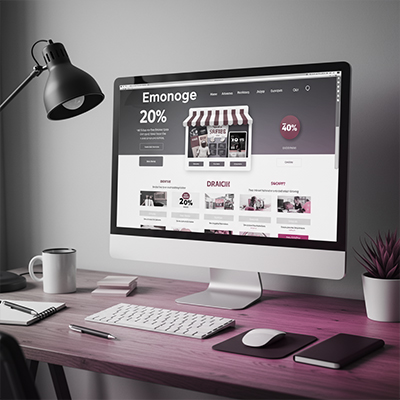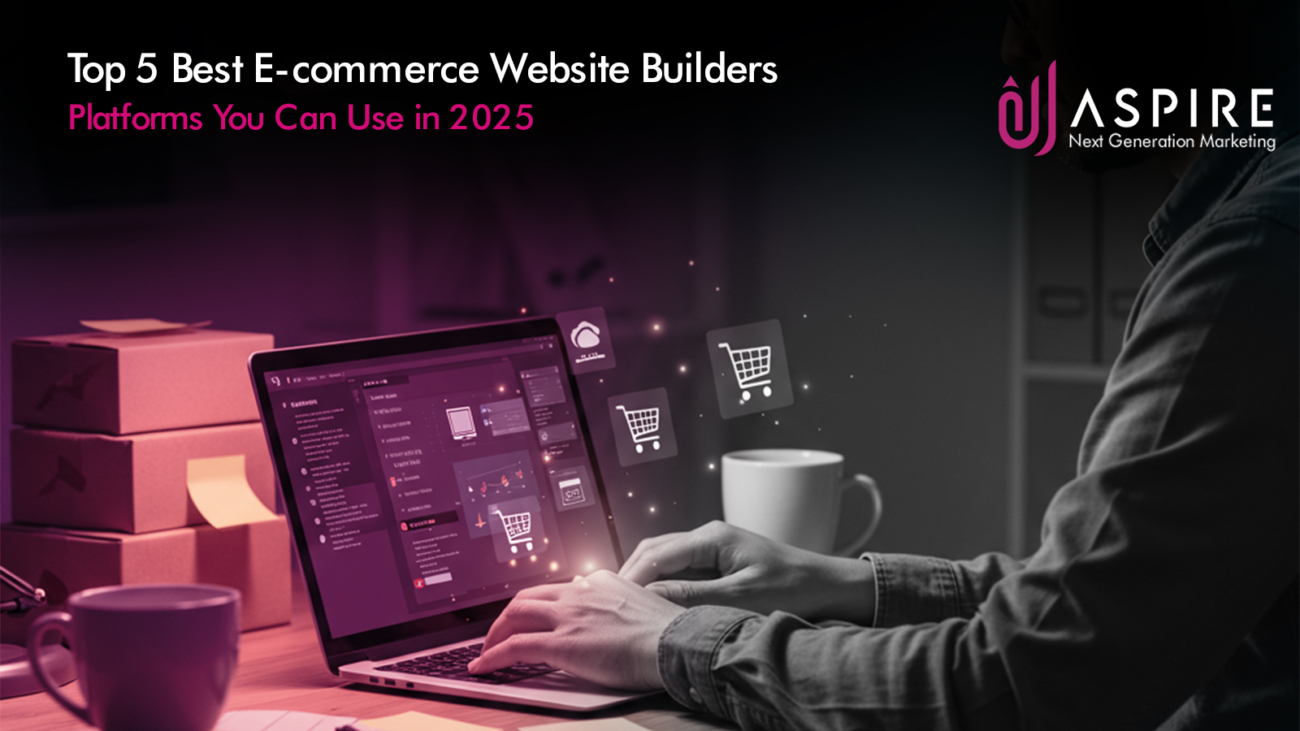The digital space all over the world is evolving very fast, and online selling has never been more competitive. Brands today are constantly seeking the best e-Commerce website builder platforms that not only provide functionality but also come with affordability and ease of use.
Many first-time entrepreneurs and established business owners go for choosing the right online store builder that defines their success in digital commerce. If you are one of the entrepreneur or business owners, the year 2025 offers several robust options for you. These options combine modern design tools, marketing capabilities, scalable features, etc.
Let us explore the top five e-commerce website builders that can help you to build one of the best e-commerce platforms.
Table of Contents
1. Shopify
Shopify remains one of the most popular and best eCommerce platforms globally. The platform is known for its reliability, wide range of themes, and powerful app ecosystem. Users can set up an online store quickly without coding skills, making it one of the most beginner-friendly eCommerce builders.
Key Features:
- Over 100 customizable themes tailored for different industries.
- Integrated payment solutions including Shopify Payments, PayPal, and Stripe.
- Extensive app marketplace for inventory management, dropshipping, and marketing.
- Advanced analytics to track sales, customer behavior, and growth.

Why it stands out:
Shopify is one of the best website builders. It helps all businesses of all sizes to scale well. It is the same with the small businesses, as they benefit from its ease of setup. Large enterprises take advantage of advanced features such as multichannel selling and international payment gateways.
2. Wix e-Commerce
Wix is widely recognized for its drag-and-drop design editor, making it one of the most beginner-friendly eCommerce builders available today. Its affordability and intuitive interface attract small businesses and creative entrepreneurs who want a visually appealing store.
Key Features:
- Simple drag-and-drop design with over 800 templates.
- AI-driven site builder for fast store setup.
- Built-in SEO and marketing tools.
- Integration with dropshipping partners such as Modalyst.
- Secure payment gateways and mobile-optimized checkout.
Why it stands out:
Wix allows businesses complete creative control, enabling designers to design unique stores without professional help.
3. BigCommerce
BigCommerce is another top contender in the list of best eCommerce platforms. Known for its flexibility and scalability, it caters to businesses seeking advanced features and strong integration capabilities.
Key Features:
- No transaction fees on sales.
- Multi-channel selling across Amazon, eBay, Facebook, and Instagram.
- Built-in tools for SEO, product management, and marketing automation.
- High-performance hosting with fast page load speeds.
- Advanced customization options for developers and enterprises.
Why it stands out:
BigCommerce provides enterprise-grade features without requiring extensive technical expertise. Businesses focused on growth and omnichannel strategies often prefer this platform.
4. WooCommerce
WooCommerce, a plugin for WordPress, remains one of the most flexible e-Commerce website builders in 2025. It is ideal for those who already use WordPress and want to expand into online selling.
Key Features:
- Full control over store customization and design.
- Thousands of extensions for payments, shipping, and marketing.
- Integration with popular payment providers like Stripe, PayPal, and Razorpay.
- SEO-friendly structure due to WordPress foundation.
- Suitable for both digital and physical products.
Why it stands out:
WooCommerce offers unmatched customization options. Business owners who want a tailored solution often choose it, as long as they are comfortable handling WordPress or working with developers.
5. Odoo eCommerce
Odoo is an open-source platform that combines e-commerce with a complete business management suite. Beyond selling online, Odoo integrates seamlessly with accounting, inventory, CRM, and marketing tools, making it ideal for businesses seeking an all-in-one solution.
Key Features:
- Fully integrated with Odoo ERP modules such as inventory and CRM.
- Easy drag-and-drop website builder.
- Multi-language and multi-currency support.
- SEO-friendly and mobile-optimized designs.
- Strong community support with thousands of plugins.
Why it stands out:
Odoo is not only an e-commerce website builder but a full-fledged business management platform. Companies looking for both affordability and operational integration often find Odoo to be a perfect fit.
How to Get Affordable Hosting for eCommerce Stores
A reliable hosting service ensures your online store is fast, secure, and always accessible. Popular hosting providers such as GoDaddy and Hostinger offer affordable solutions tailored for eCommerce websites. GoDaddy provides domain registration, SSL certificates, and 24/7 support, while Hostinger is known for budget-friendly plans with strong performance. Choosing the right hosting platform is essential for maintaining uptime, improving website speed, and delivering a seamless shopping experience to customers.

Choosing the Right eCommerce Website Builder in 2025
Selecting the right platform depends on your business goals, budget, and technical knowledge. Here are a few factors to consider:
- Ease of Use: For beginners, platforms like Wix and Shopify provide quick setup and simple navigation.
- Scalability: Businesses expecting rapid growth should consider BigCommerce or WooCommerce for flexibility and advanced tools.
- Design Needs: Odoo offers complete integration of e-commerce and business operations for those seeking efficiency.
- Affordability: Wix and WooCommerce can be the most cost-effective for small startups.
If you are new to online selling and need professional guidance, Aspire Digital Media can help. It is recognized as the best e-commerce website design company in Kolkata. The team specializes in building modern, conversion-focused online stores tailored to your business needs.
Conclusion
We all know that the digital marketplace continues to evolve every day, and it is also simple to understand that businesses today need reliable online store builders to stay ahead. Each platform that is mentioned in the blog offers unique strengths, from beginner-friendly eCommerce builders to highly customizable solutions for scaling enterprises. Entrepreneurs and business owners must weigh affordability, design flexibility, and long-term growth potential before choosing the right fit.
By carefully selecting the right platform, you can build an online store that not only looks professional but also provides seamless shopping experiences for your customers. A strong digital presence will position your brand to succeed in the ever-growing world of e-commerce.
Read more: 8 Steps to Build a User-Friendly Website for Small Businesses
FAQ
Which is the most beginner-friendly eCommerce platform in 2025?
Shopify and Wix are considered the most beginner-friendly eCommerce builders due to their intuitive setup, drag-and-drop features, and extensive support resources.
Do I need separate hosting for my eCommerce store?
Platforms like Shopify, BigCommerce, and Wix include hosting within their plans. WooCommerce and Odoo require separate hosting, which can be arranged through providers such as GoDaddy or Hostinger for affordability and reliability.
Which eCommerce platform is best for scaling a business?
BigCommerce and WooCommerce are ideal for businesses planning rapid growth. Both offer flexibility, scalability, and strong integrations that support high-volume sales and multichannel strategies.

